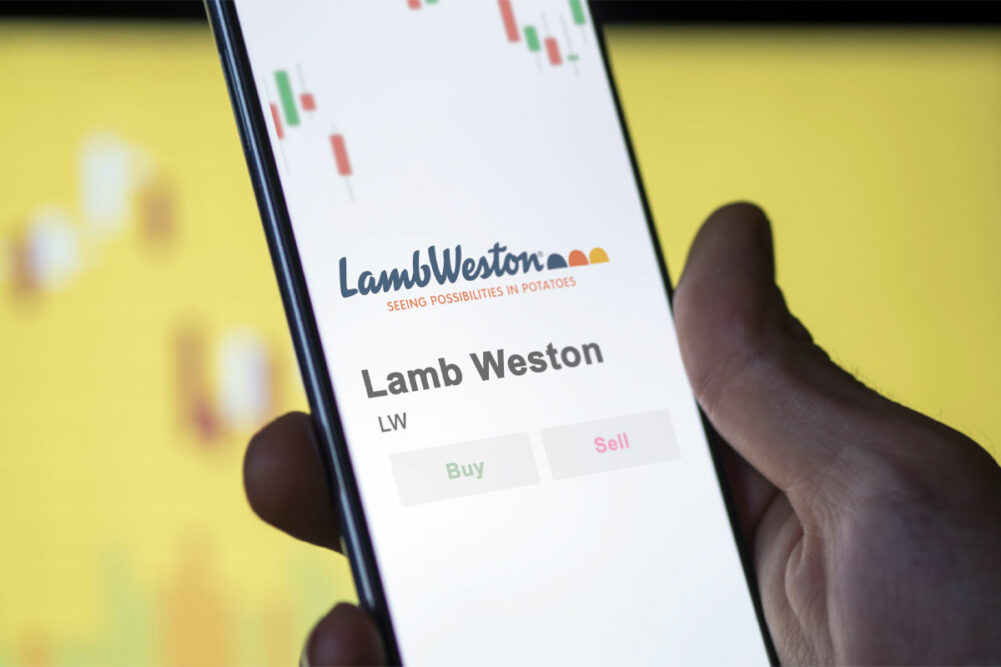EAGLE, IDAHO — Despite Lamb Weston Holdings, Inc. writing off excess raw potatoes in North America, sales and net income for the company increased in the second quarter ended Nov. 26, 2023.
Lamb Weston, in writing off the potatoes, recorded $65 million in cost of sales and $6 million in equity investment earnings, said Thomas P. Werner, president and chief executive officer, in a Jan. 4 conference call.
“In January 2023, we developed an initial sales forecast for the following fiscal year that reflected a gradually strengthening consumer and recovery in global demand,” he said. “That forecast was developed based on the information available at that time. We used this initial sales forecast to determine the number of contracted acres to grow the raw potatoes needed to deliver that sales forecast.
“Per our agreements with our growers, we're obligated to purchase all the potatoes grown on these contracted acres. However, our initial sales forecast has turned out to be more aggressive than our current estimate, reflecting recent restaurant traffic and demand trends as consumers continue to absorb the cumulative effect of inflation. As a result, we have purchased more potatoes than we need to meet our current sales targets and have taken a charge to write off the estimated excess.”
Second-quarter net income of $215 million, or $1.48 per share on the common stock, was more than double the $103 million, or 72¢ per share, in the previous year’s second quarter, which included a total net loss of $78 million from unrealized mark-to-market adjustments associated with commodity and currency hedging contracts, foreign currency exchange losses and items impacting comparability.
Net sales increased 36% to $1.73 billion from $1.28 billion. This year’s second quarter included $375.8 million of incremental sales attributable to the consolidation of the financial results of acquiring the remaining interest in LW EMEA, the company’s former joint venture in Europe. Net sales excluding the incremental sales attributable to the LW EMEA acquisition increased 6%.
Price/mix increased 12%, reflecting the benefit of inflation-driven pricing actions. Volume declined 6%, primarily reflecting the carryover effect of the company’s decision to exit certain lower-priced and lower-margin businesses.
In North America, net sales increased 10% to $1.17 billion. Adjusted EBITDA was $321 million. The carryover benefit of inflation-driven pricing actions and favorable mix was offset partially by a $66.3 million charge for the write-off of excess raw potatoes, higher costs per lb and the impact of lower volume.
In International, net sales, which included $375.8 million of incremental sales attributable to the consolidation of the LW EMEA financial results, increased 164% to $565 million.
The business in China is growing by double-digit percentages, Werner said.
“We just opened up our second factory over there,” he said. “It's up and running and operating. It gives us considerable flexibility as we’re thinking about the next year's contracting coming up.”
Over the first half of the fiscal year, Lamb Weston’s companywide net income was $450 million, or $3.10 per share on the common stock, which was up from $335 million, or $2.33 per share, in the same time of the previous year. Net sales rose to $3.40 billion from $2.40 billion.
For the fiscal year, Lamb Weston reaffirmed its net sales target of $6.8 billion to $7 billion. The company for the fiscal year raised its GAAP net income target to $830 million to $900 million.
“We expect our volumes will continue to recover in fiscal 2025 and have planned to contract for acres accordingly,” Werner said. “While we are disappointed with the write-offs, the underlying fundamentals of the business, our operations in the category remain solid. Our volume trends are improving in line with our expectations. Global demand is resilient as consumers continue to face stiff food-away-from-home inflation.”




